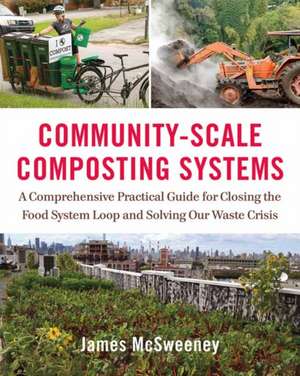Community-Scale Composting Systems
Autor James McSweeneyen Limba Engleză Hardback – 29 ian 2019
The main scope of the book is dedicated to compost system options and design, from basic sizing and layout to advanced techniques such as aerated static pile composting. Management techniques and operational considerations are also covered, including testing, feedstock characteristics, compost recipe development, and system-specific best management practices.
Though focused on recycling systems that include food scraps--the fastest growing sector of community-scale composting--the book is informed by and relevant to other composting sectors and will be a vital resource for anyone invested in diverting organic materials away from landfilling and incineration. Topics covered include:
- Community-scale models
- Estimating organics from individual generators and whole communities
- Food scrap collection
- Compost system sizing
- Aerated static pile (ASP) systems design
- In-vessel systems selection
- Integrating animals with composting
- Compatibility with compost heat recovery, vermicomposting, and other specialized methodologies
- Composting best management practices
- Nuisance management
- Mitigating persistent herbicides
- End uses, marketing, and sales
Preț: 297.58 lei
Preț vechi: 348.75 lei
-15% Nou
Puncte Express: 446
Preț estimativ în valută:
56.95€ • 61.84$ • 47.84£
56.95€ • 61.84$ • 47.84£
Carte indisponibilă temporar
Doresc să fiu notificat când acest titlu va fi disponibil:
Se trimite...
Preluare comenzi: 021 569.72.76
Specificații
ISBN-13: 9781603586542
ISBN-10: 1603586547
Pagini: 464
Ilustrații: Full-color photographs and illustrations throughout
Dimensiuni: 209 x 258 x 31 mm
Greutate: 1.48 kg
Editura: Chelsea Green Publishing Company
ISBN-10: 1603586547
Pagini: 464
Ilustrații: Full-color photographs and illustrations throughout
Dimensiuni: 209 x 258 x 31 mm
Greutate: 1.48 kg
Editura: Chelsea Green Publishing Company
Descriere
In-depth yet accessible, Community-Scale Composting Systems is a technical resource for farmers, designers, service providers, organics recycling entrepreneurs, and advocates of all types, with a focus on developing the next generation of organics recycling infrastructure that can enable communities to close the food-soil loop in their local food systems.
